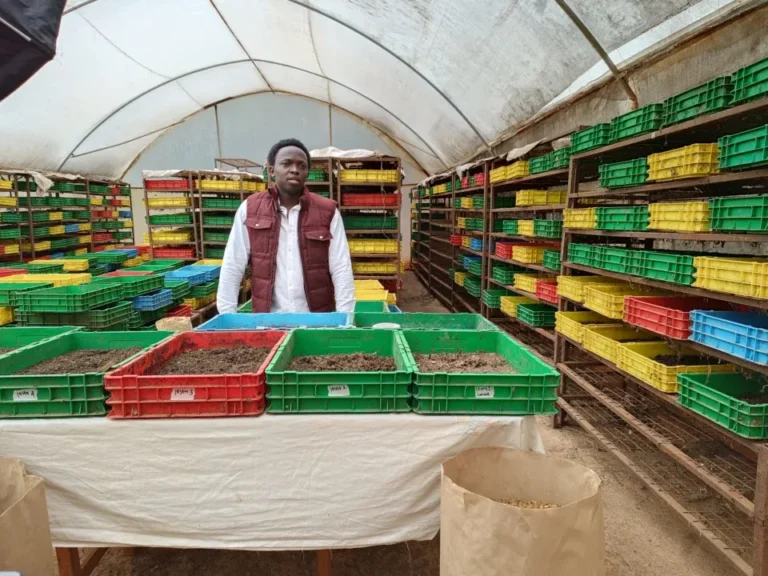The Black Soldier Fly is a sleek looking fly that many confuse with a wasp, however, it does not have a stinger as such it is not a danger to anyone. Other than being harmless, this fly is actually very beneficial in that it converts waste to produce organic fertilizer, foliar, animal feed and even pesticide.
One of the companies that are farming this fly in the Kenyan market is Zihanga Limited a company which was founded by Nicholas Mareve and Brain Amenya both of whom are 25 years of age. Their journey to BSF farming is quite interesting because, it essentially a matter of luck and persistence. Thing is Nicholas who studied Finance & Economics at USIU, had an economics lecturer who during one class told them about the benefits of insect farming. Nicholas got so intrigued by the project that he used to hound his professor daily so as to get more information.
Spending the morning at Ltd Zihanga Ltd Farm in Kabete courtesy of @SafaricomFDN learning about how they make organic fertilizer and animal feed using the Black Soldier Fly pic.twitter.com/wBqzZY65VG
— TheInsider (@The_InsiderKe) November 25, 2022
After about a month of being hounded the Professor finally gave in and introduced them to Dr. Tanga who is the head scientist at International Centre of Insect Physiology and Ecology (ICIPE). As luck would have it, ICIPE had a program whereby they were helping the youth start such projects and Dr. Tanga gave them a green house, cages, the BSF and trays to kickstart the project free of charge. He also connected them to the Rockerfeller Foundation who were able to give them a grant that enabled them to meet the running costs of the project which enabled them to hire employees to help run the project.
In these days of fighting climate change, as well as a push for sustainable living, the BSF is an important aspect of this conversation in that it utilizes waste to produce products which are beneficial to mankind. The thing is when organic waste rots, it produces methane gas which is harmful to the environment. However, the BSF by converting this waste to organic fertilizer, is able to assist in the fight against climate change while at the same time boosting agricultural production. As a matter of fact, Zihanga has helped a slaughter house in Kabete dispose of all its waste something which used to be a big challenge for them. So far, the company has been able to utilize over 700 tons of waste in their neighborhood which would have otherwise been polluting the environment.
Other than fighting climate change, the BSF byproducts such as the organic fertilizer which has a high concentration of Nitrogen, Potassium and Phosphorus (NPK) is highly effective. According to the company, it increases yields by over the 30% with results being visible in just two weeks after application. It also has the ability of healing soil which has been degraded by the use of too much organic fertilizer over time. The BSF waste can also be used to make foliar fertilizer which can then be used to spray on the plants. This product is made by soaking the organic fertilizer for about two months to create a very potent foliar.
Dried BSF maggots can also be used as feed for animals like chicken, dogs and cats. The maggots have a very high protein content of over 50 per cent and about 30% fat which result in animals with healthier fur, when fed to chicken, it results in a higher egg production and a stronger shell. When it comes to pigs, the company indicated that it reduces the maturity period of the pigs from 8 months to about 5 months. Zihanga sells this product as just Ksh. 120 per kg and it has proved to be so popular with farmers due to the quality and affordable pricing that nowadays one has to book in advance to get their order.
Despite the various benefits of the BSF, the project has had its fair share of challenges for Zihanga including inadequate knowledge about BSF farming and financing. Fortunately, over time they have been able to teach themselves on the best farming practices to a point where they are now offering free training to interested youth and women groups. This is in line with the Safaricom “Tuinuane” initiative which is aimed at encouraging Kenyans to uplift one another.

